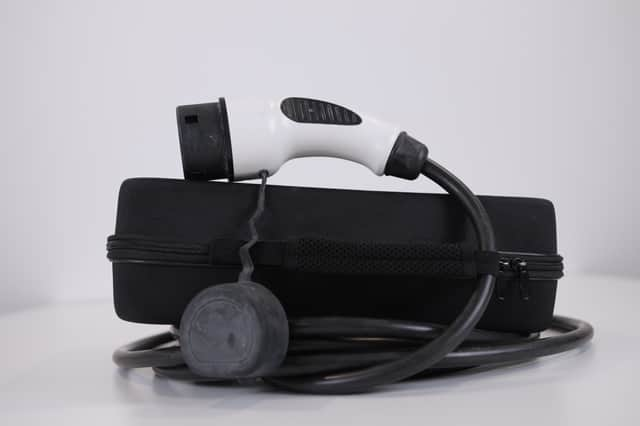Electric car drivers warned over shock risk from ‘dangerous’ charger cables sold on Amazon and eBay
and live on Freeview channel 276
Electric car drivers are being warned of dangerous aftermarket charging cables that pose a risk of electric shock or fire being sold on UK websites.
Consumer safety charity Electrical Safety First found the substandard cables for sale on major marketplaces including eBay and Amazon and has warned drivers that they could be putting their lives at risk by falling for too-good-to-be-true deals.
Advertisement
Hide AdAdvertisement
Hide AdIt said that the cost of living crisis had led to a rise in consumers using online marketplaces to compare prices, leading to fears more buyers than ever are being exposed to potentially dangerous products in their search for savings.
One charging cable purchased from eBay presented a risk of electric shock and overheating when it was tested by a specialist lab. Two other EV charging cables bought from third-party sellers via Amazon Marketplace also failed electric shock tests, exposing users to a major hazard. All three cables have since been removed from sale by the marketplaces.
Most EVs come with a charging cable from the manufacturer but owners looking for a spare or a replacement for a damaged or stolen cable can easily pick them up via online retailers.
While most are perfectly safe, ESF warns that drivers looking to save money could put themselves at risk by choosing a cheap and substandard unit. The cables regularly cost between £150 and £200, but some sellers on Amazon and eBay offer them for less than £100, raising concerns about their safety.
Advertisement
Hide AdAdvertisement
Hide AdLesley Rudd, chief executive at Electrical Safety First said: “Charging your car should never put you at risk and the devices we found for sale via online marketplaces risk turning the everyday task of charging up into a potential hazard. The three cables we tested failed to meet safety requirements and left buyers at risk of electric shock and posed a risk of overheating.


“If you’re looking for a charging cable for your electric car, stick to reputable retailers you know and trust to avoid being duped by a dodgy version that is potentially dangerous. If in any doubt, speak directly to the car manufacturer.”
Rudd added that “the same laws governing high street retailers don’t apply to these online giants”, leaving buyers more exposed to substandard items. She said: "Until the government introduces laws to force online marketplaces to take reasonable steps to ensure goods sold via their platforms are safe, EV owners and shoppers of all types of electrical goods remain at risk.”
A spokesperson for Amazon said: “Safety is a top priority at Amazon and we require all products in our store to comply with applicable laws and regulations. We have removed these products while we investigate.
Advertisement
Hide AdAdvertisement
Hide Ad“If customers have concerns about an item they’ve purchased, we encourage them to contact us directly so we can investigate and take appropriate action.”
EBay said it used filter algorithms to block unsafe products from making it to sale but that if any did get through it worked “swiftly” to remove them and raise the issue with sellers.
A spokesperson added: “We take a proactive approach to keeping our users safe, it’s our top priority. We have removed the items that Electrical Safety First flagged to us, and alerted buyers who purchased one of the items within the last 90 days.”
The dodgy EV charging cables were included on a list of the most dangerous electrical goods found for sale online by ESF’s experts. The list also included a portable heater which posed an “imminent risk to life” due to easily accessible live elements carrying 240V; a “waterproof” extension lead with no waterproof capabilities and a food blender that started to overheat and smoke the first time it was switched on.
Comment Guidelines
National World encourages reader discussion on our stories. User feedback, insights and back-and-forth exchanges add a rich layer of context to reporting. Please review our Community Guidelines before commenting.
